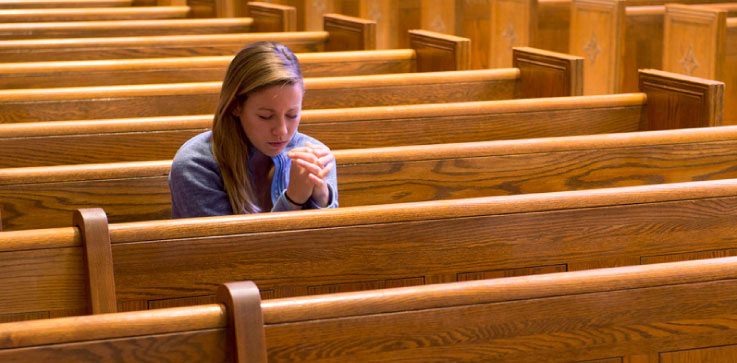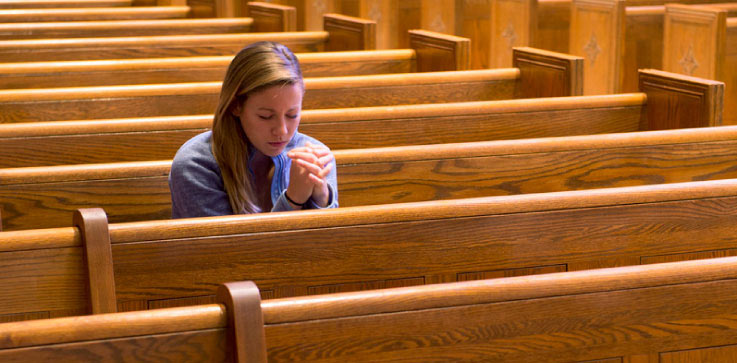[caption caption="http://campaign.loyola.edu/-/media/utility/images/campaign/prioritysliders/ministry_indivdual4.ashx"][/caption]
Background
Diversity is a fact of life. No one is the same, one person difference with other person. With the growing individualism, the demand to understand the plurality is increasing in various fields in society. This also happens in education, particularly religious education; everyone is thinking how to create a form of education that accommodates the diversity of learners. On the other hand, whether conscious or not, there is a gap between one's religious knowledge, faith and behavior. In that case, a person's behavior is not always motivated by what he/she should believe. It could even be found that people's behavior contrary to what he/she should believes. In the struggle that so, this paper has appointed.
This study is to identifying the influence of the academic subjects, Christian studies, to student’s spirituality, in UPH Surabaya. Theology and spirituality are two things that can not be separate. The knowledge of God will enforce someone to build their spirituality and their spirituality will enforce them to learn theology. Although writer realizes that there are many things that influence the student’s spirituality, but knowledge become the basis of ideology and practice of spiritual life. Therefore, students who get the religion subjects will have different spirituality than before. From this study we will identify the influence of the religion subjects that given to the student, especially in their personal life and at their social life. As my presupposition the spirituality of the student will be build with the religion subjects given by university. The end result of this paper, are expected to give and improvements; how we can improve the model of Christian education, religious education, in the context of Indonesia as a compound. So, as an Indonesia university, with a vision of global campus, I believe that this study will show us how to build Indonesia, one largest country in Asia.
Education in Indonesia
Higher Education
Law of Republic of Indonesia, number 20 in 2003, on National Education System (State Gazette of the Republic of Indonesia Year 2003 Number 78, Supplementary State Gazette of the Republic of Indonesia Number 4301), Chapter 2 about the Basis, Function and Purpose said that, "National Education functions to develop the ability and character as well as the civilization of the nation's dignity in the framework of the nation's intellectual life." Further explained that education "aims at developing the potential of learners in order to become a man of faith and piety to God Almighty, have a certain noble character, healthy, knowledgeable, capable, creative, independent, and become citizens of a democratic and accountable." Noting the early part of this law then we can conclude that the measure of the success of Indonesia's national education is the ability and character skills, other than that the first aim is faith and devotion to God Almighty. This becomes interesting when many scientists in the western view of education are only concerned with the skills and expertise in their respective fields, regardless of one's character and faith.
Furthermore, it is translated in Decision of the Director General of Higher Education, Ministry of National Education, Republic of Indonesia, number 43/DIKTI/Kep/2006, about the role for the implementation of the course of personality development (MPK) in higher education. Article 1 described, that the vision of the MPK is “a source of values and guidelines in the development and implementation of programs of study in order to deliver the student to establish his personality as a complete Indonesian man." To achieve the mission, higher education has to “help students solidify his personality that is consistently capable of embody the basic values of religion and culture, a sense of nationalism and love of homeland lifetime; in mastering, applying and developing science, technology, and art with a sense of responsibility."
In particular, this decision also provides direction for the substance of the content of the course. The substance of religion course consists of:
- One God and Godhead: faith and devotion, philosophy of lordship (Theology);
- Human: the nature of human, human dignity, and responsibilities of the human;
- Law: raise awareness to obey the law of God, and prophetic function of religion in law;
- Moral: religion as a source of moral, and morals noble in life;
- Science, Technology and the Arts: faith, science and technology and charity as a whole, requires of liability and the practice of science, and the responsibility of scientists and artists;
- Inter-religious harmony: religion is God's grace for all, and togetherness in religious plurality;
- Community: civilized and prosperous society, the role of religious communities in creating a civilized and prosperous society, and human rights and democracy;
- Culture: academic culture, and work ethic, openness and fair; and
- Politics: the contribution of religion in political life, and the role of religion in the realization of national unity
This content should be implementing in the course content of religion subject. When you consider these demands we can see that in the life of religious education in Indonesia is expected to comprehensively touch every side of human life. Not just talking about doctrine, but also about personal development of learners, to apply his faith in daily life in the community.
UPH Surabaya as Christian Higher Education
As a Christian higher education, UPH Surabaya, tried to keep the Christian mission and pay attention to government regulations. Our leader state our institution vision as “To be a prime international institution of holistic, transformational higher education that will develop competent leaders and professionals who are equipped with true knowledge, possess faith in God, and exemplify godly character.” It might be said that the education over by this institution is holistic education. Our former rector speech in the graduation day last year said:
Holistic education is education that restores and develops the entire potential of the gift of God in unity and harmony, which is considered the spiritual dimension, intellectual, emotional, physical, social, character, manners, arts, culture, and sports. Holistic education should encourage the learners, to understand oneself fully, finding his true identity, and understand the meaning and purpose of life in wholeness.
One of our leaders of UPH in other occasion said:
As a model Christian University for all of Asia, UPH is intentional in assisting students to become whole persons who develop the mind, body and character through the paradigm of spiritual and intellectual growth. Programs of study include key biblical and religious teachings that encourage spiritual development. In addition, residence life programs, sports programs and student leadership programs provide students with “real living experiences” under the guidance and direction of experienced, seasoned veterans. Students are encouraged to learn from and through all of life’s experiences. Lecturers and staff help students wrestle with many of the challenges that provide important opportunities for personal growth. (Gary A. Miller.)











